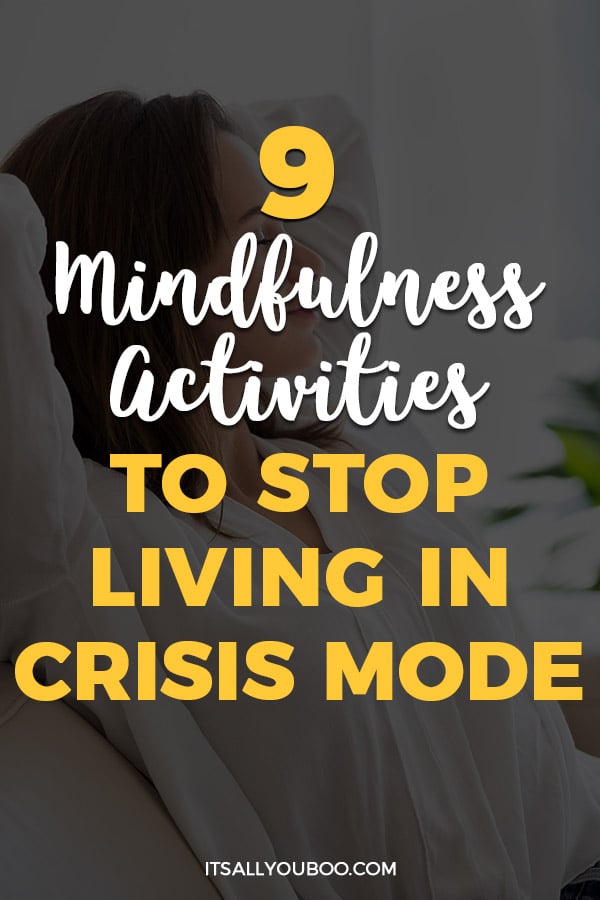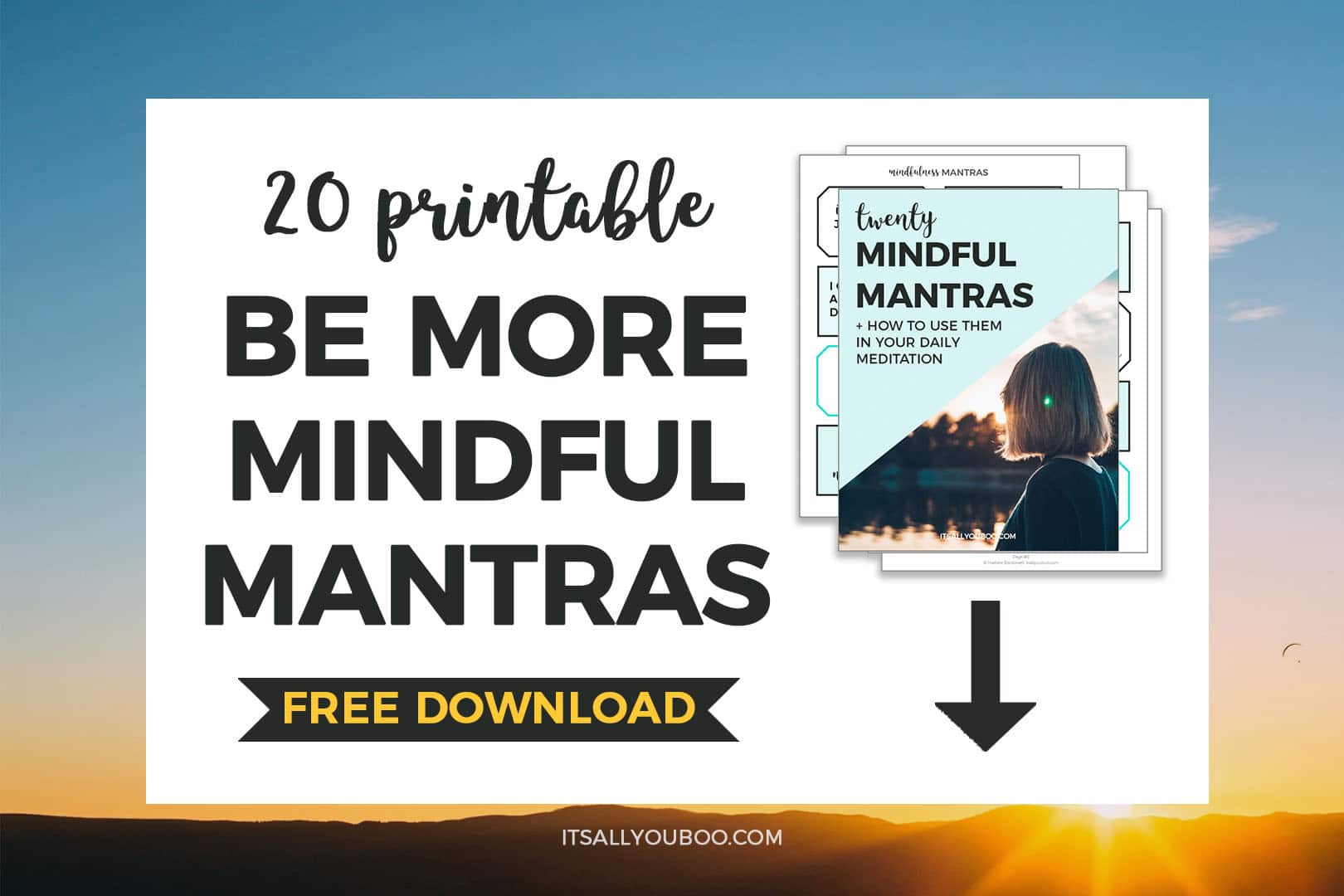Want to do 5-minute mindfulness activities and exercises for stress and anxiety? Looking for mindfulness activities to stop living in crisis mode?
Your mouth gets dry, your breathing shallow and you’re maybe even having a panic attack. Your mind starts swimming and spiraling, and you just can’t stop thinking about all the ways things can go wrong.
With the global pandemic, jobs being lost, facing a financial crisis, and health care in crisis, you’re not the only one feeling intense stress, anxiety, worry, sadness, or any other powerful emotions.
Or any personal tragedy or challenging struggle can send you into a state of crisis and panic. Whether’s that the loss of a loved one, scary diagnoses, or even the thought of facing your fears.
So how do you snap out of it? How do you get out of a crisis? It’s simple: by practicing mindfulness activities every day.
You might be wondering, okay, what exactly is mindfulness? According to Mindfulness.org,
“Mindfulness is the basic human ability to be fully present, aware of where we are and what we’re doing, and not overly reactive or overwhelmed by what’s going on around us.”
With your normal life in pieces or even your day in chaos, use these 9 mindfulness activities to stop living in crisis mode. To be more present, rather than worrying about the future or panicking about the past.
Each mindfulness exercise is free and only takes 5 minutes to do. They are calming examples of mindfulness in everyday life.
THIS POST MAY CONTAIN AFFILIATE LINKS.
IF YOU MAKE A PURCHASE FROM THESE LINKS, I MAY EARN A SMALL COMMISSION.
CLICK HERE FOR MY FULL DISCLAIMER STATEMENT.
Mindfulness Activities to Stop Living in Crisis Mode
#1. Bring Your Attention to Each Moment
The most important thing you can do in a crisis mode is to stay present. That seems counterintuitive because naturally, we want to escape or avoid this huge problem we are facing.
What happens in a crisis, though, is that our thoughts and worries begin to run wild, escalating our fears and threatening to spiral us out of control. We imagine all sorts of worst-case scenarios, and we become less equipped to deal with the situation at hand.
Therefore, purposefully staying present in your current moment will help ground you and reign in your racing thoughts and anxiety. This act of staying present is known as mindfulness. Use all your senses to bring your attention and awareness to each moment.
When you can be present in each moment as it comes, one at a time, you remain more centered and can deal with problems more calmly and rationally.

Tanya Peterson, National Certified Counselor
Tanya Peterson a National Certified Counselor (NCC) through the National Board for Certified Counselors. She’s also a writer for Choosing Therapy (a mental & behavioral health startup based in Brooklyn, NY). Tanya’s an expert on postpartum relationships and has also written extensively on the subject of anxiety including countless web publications and four books.
#2. Daily Mindfulness Meditation
Taking mental health breaks is key to coping in a crisis, as the crisis can overwhelm our natural resilience and coping strategies. Replace the stress and anxiety by at least a few minutes of mindfulness meditation per day. Just a few minutes can help you stop living in crisis mode.
The idea is to disconnect yourself from the crisis and instead focus on taking slow, deep breaths while laying in a comfortable position with your eyes closed. When you start doing this, it may be difficult and your thoughts may wander frequently, but mindfulness is a skill that develops over time, and eventually, you will be able to clear your mind.
👉🏽 RELATED POST: How to Meditate for Beginners
You can choose from multiple popular mindfulness apps (e..g. Headspace, Calm) or you can search guided practices on YouTube. Research has identified multiple positive long-term changes in the brain as a result of consistent mindfulness practice! In fact, Mindfulness-Based Cognitive Therapy (MBCT) is one of the many common treatment options for major depressive disorder, so you will find mental health professionals using mindfulness in their practice with patients too.

Dr. Patricia Celan, Psychiatry Resident
Dr. Patricia Celan is a psychiatry resident at Dalhousie University. She completed her M.D. at the University of British Columbia. Connect with her on LinkedIn.
#3. Go Through Each of Your Senses
A great mindfulness activity to stop living in crisis mode is to feel grounded. Specifically, an exercise to help you feel grounded. Find a somewhat quiet space and sit down for a couple of minutes, take 3 deep breaths, and go through each of the senses:
- What do I see? look around and examine your space
- What do I hear? Listen around and examine your space
- What do I taste? examine and particular or lack thereof in your mouth
- What do I smell? Smell your space and think about what you can smell in the air.
- What do I feel? how does the ground feel between your feet? How do your clothes feel against your body?
This is a great exercise to do when you’re feeling overwhelmed, stressed, and will help you get through a crisis.

Nadine, Wellness Blogger
Nadine is a mom and wife residing in sunny Miami, Florida. Her journey to wellness started out as just wanting her kids to eat well. So she launched her blog, Body Up Boss Up, to create a safe space and to help people find what being well means to them. She inspires wellness, mindful eating, sustainability, and plant power. She will also be launching her herbal medicine consultancy soon.
#4. Practice Grounding Exercises Daily
Grounding exercises can be particularly helpful in navigating times of high stress and uncertainty. When you notice you are feeling on edge, anxious, or having racing thoughts, tuning into all five senses to bring yourself back into the present moment can ease some of the discomfort.
Start by naming five colors you can see followed by four things you can feel like your shoes on your feet or your back on the chair. Then identify three sounds you can hear, two things you can smell, and one thing you can taste.
👉🏽 RELATED POST: How to Practice Mindfulness Throughout the Day
This exercise can be paired with very deliberate, controlled breathing and repeated as many times as needed until you feel more calm and present. I recommend that clients practice this exercise throughout the day so they are used to it and able to use it when they notice they are starting to feel escalated.
Grounding exercises are one of the best daily mindfulness activities to stop living in crisis mode.

Alyssa McKeeman, Mental Health Counselor
Alyssa McKeeman, EdS, MEd, LPCA is a mental health counselor and owner of Blue Ridge Psychotherapy in Clemson, South Carolina where she specializes in the treatment of eating disorders, depression, and anxiety. Instagram: @therapywithalyssa.
#5. Tidy Up Your Mind
If you’ve ever applied Marie Kondo’s ‘magical art of tidying up’ to your chest of drawers, you’ll know that when your sweaters are stacked sideways, you get a clear view of ALL your options, not just the messy ones on top — not just the ones you reach for daily because they’re top of mind.
When we’re in crisis mode, feelings of hopelessness naturally find their way to the top, but that doesn’t mean there aren’t alternatives hiding beneath the surface. To access them, try applying the magical art of tidying up to your mind.
Take a few moments to jot down your feelings – not just the ones that are heightened in your present state, but all feelings you know you are capable of having. Mindfully explore the full spectrum, from sad, pessimistic, fearful, and anxious to comfortable, trusting, relaxed, happy, and thankful.
While you can’t donate your negative feelings to a local clothing bank (nor should you — they’re part of the human experience), when you tidy up a little, you allow those you’ve forgotten about to see the light of day, thereby presenting you with a clear view of ALL your options.

Viv Singer, Life Coach
Viv Singer is a Toronto-based life coach and personal growth writer. An optimist by choice (not by nature), she promotes self-awareness and empowers others to live with greater confidence, authenticity, and joy. Read more from Viv at Viv For Today. Or connect with her on Instagram at @VivForToday.
#6. Use the Worry Tool Technique
This crisis can make the future feel uncertain. So, it’s normal if you’ve been spending a lot of your time worrying lately. But it’s probably not feeling great. The worry tool technique is about time-blocking your worries. So, you schedule a time to focus on what you’re worried about, so it doesn’t take over your entire day.
- Set aside 15-30 minutes of your day when you won’t be interrupted. It’s best if you can find a quiet, comfortable, and private space.
- Choose how you’d like to focus your worries. You can record them by writing them down, or using a voice recorder on your phone. You could also just sit and think quietly, or speak out loud. We recommend recording them since the act itself can be helpful. But really, it’s all about what works for you.
👉🏽 RELATED POST: How to Deal with Panic Attacks and Anxiety
- Set a timer. Remember, this is all about being deliberate. You’re creating a time box for your worries. So, don’t let yourself keep going and going after the timer goes off.
- Take a few deep breaths. That might have been a pretty intense 15-30 minutes. So, give yourself some time to relax afterward. You could listen to a guided meditation or breathe deeply on your own.
- If the worry pops up again later in your day, remind yourself that you already took the time to focus on that issue. If needed, you can always schedule another session.
Try this practice any time you need to feel more grounded. This tip is a grounding practice based in Cognitive Behavioral Therapy, offered by our nonprofit All Mental Health. It’s part of our guide to help support people’s mental health during this crisis. It’s one of the best mindfulness activities to help you stop living in crisis mode all day long.

Ryann Summers, Co-founder and Director of Content at All Mental Health
All Mental Health is a technology-driven nonprofit with a mission to increase access to mental health education. Find a supportive community to help you through a difficult breakup, or visit allmentalhealth.org.
#7. Learn Something New to Stay Present
By learning a new hobby we create space to be in the present. This allows for emotional release as well as routine. Creating a routine when feeling overwhelmed and anxious gives us stability and helps practice grounding techniques.
During this crucial time when our lives are in crisis and feel unmanageable, we are needing to create not only a new routine but having to focus deeply on remaining in the present. I have found that learning something new that helps me to remain focused and aligned with myself.
Something I have always wanted to learn was developing the strength and trust in my body to get into a complete handstand. As this is a skill that takes focus and the overall time it is something you can learn gradually. Other hobbies could be yoga, drawing, or even a new language.
Finding something that keeps your focus in the present moment and developing a skill over time will help to relieve your anxiety and balance your emotional wellbeing during this vulnerable time we are all facing. The next time you’re in crisis mode, stop and focus on learning something new.

Chelsea Bared
Chelsea Bared is a blogger and writer dedicated to connecting people through vulnerability and storytelling. She runs a blog where she tells her story of recovery, relationships, and truth.
#8. Close Your Eyes and Go Within
When we begin to panic and worry about all the things that could go wrong, we are taken out of the present moment. As our mind races, our heart pounds, and the amygdala, the portion of our brain responsible for our fight or flight response actually swells which prevents us from thinking clearly.
To combat this, we need to sit down, close our eyes, and breathe deeply. By closing our eyes and breathing deeply, we begin to calm the activated part of our brain, which sends signals to relax our body.
Once we begin to calm our nervous system, we can repeat positive affirmations such as, “I can handle anything, All is well, or I am alright.” Our mind naturally worries about future events or ruminates about things from the past. When we stay in the present moment, close our eyes, and search our heart, we remember that we are okay and we allow ourselves to think rationally about our next step to cope with our situation.
This is one of the best mindfulness activities to stop living in crisis mode. Just close your eyes, breathe slowly, and go within.

Lynell Ross, Wellness Coach
Lynell Ross is a Certified Psychology Based Health and Wellness Coach through Wellcoaches, as well as a Certified Personal Trainer with The American Council on Exercise, a Behavior Change Specialist, and a Nutritionist. Her work as a Health and Wellness Coach provides her with the opportunity to help people through individual coaching, teaching fitness, healthy cooking, and stress management classes. She is the Founder & Managing Editor of Zivadream.
#9. Be Mindful in How Your Respond
Mindfulness teaches us to be conscious of what is happening in our present moment. It teaches us to focus on our movements, our immediate surroundings, and how we choose to react to what is taking place outside of ourselves.
Each moment, from the time we get up, gives us an opportunity to choose what we do next. Do we get out of bed, clean up and start our day with fear, anxiety, gratitude, or love? This doesn’t mean that you have to put on a happy face when you’ve lost your job and can’t afford to buy food.
Being mindful is another way to react to all the chaos and grief. We can’t control what is happening outside of our lives, but we can control how we respond to it all. Consciously choose the steps to take to help move you forward rather than getting stuck in despair that can pull you down into pity.
We have so much inner strength, but unfortunately, we tend to see it when we’re pushed to our limits through hard times. By being mindful of how you respond you are choosing to stop living in crisis mode.

Dr. Kriss Kevorkian, Grief Expert
An expert in grief, death and dying, Kriss Kevorkian, PhD, MSW, holds a doctoral degree in thanatology, the study/science of death, dying and bereavement. She combined her passion for thanatology with her love of whales and the environment through her research on environmental grief® and ecological grief®. Hailed as a true visionary, Dr. Kevorkian coined these terms years before many in the field considered these particular forms of grief.
Free Printable Mindfulness Mantras
Ready to start practicing mindfulness daily to stay calm and protect your mental health? Get your 20 FREE Printable Mindfulness Mantra cards.
Please remember to be sure to seek professional help if you need it, call a crisis line, or make an appointment with a counselor.
Wishing you the best for your mental health during these trying times.
Stay safe and take good care of your emotional health and well-being.
Need to get out of a crisis? Do these free 5-minute mindfulness exercises and habits. Click here for 9 mindfulness activities to stop living in crisis mode. #Mindfulness #InnerPeace #StayCalm #StayAtHome
What mindfulness activities to stop living in crisis mode will you use?
Last Updated on June 3, 2025






Mimi says
Every night I take my dog on a long walk and it’s both my workout and my meditation moment, I take time to reflect on my day and on my life in general. It helps me so much to avoid stress
Nadalie Bardo says
Hey Mimi,
That’s such a great daily ritual for exercise and mindfulness. I literally hope to get a dog one day soon for the same reasons. Good for mental health and physical health.
Patricia Celan says
So many helpful ideas, especially during this highly stressful time. Thank you for sharing!!
Nadalie Bardo says
Hey Patricia,
My pleasure, thanks so much for sharing your mindfulness activity with us and helping us stay calm in these beyond stressful times.
Amber Myers says
These are some great ideas. I am glad I don’t live in crisis mode. I do panic at times and then I remind myself of the good in my life.
Nadalie Bardo says
Hey Amber,
Being in crisis mode is exhausting. Sometimes it’s not a choice, it’s just our reaction to how insane things are getting. I know we could all probably use some time on the bright side of things. =)
Heather says
It’s amazing how much meditating can change my mood. I feel so much better and calmer.
Nadalie Bardo says
Hey Heather,
YES, agreed, meditation is such a great mindfulness activity. Calms the nerves, releases stress, and helps us escape crisis mode.
Mae says
Thank you for sharing. These tips are very helpful not just in times of crisis but in everyday life.
Nadalie Bardo says
Hey Mae,
So glad you found this list of 5-minute mindfulness activities helpful. Let’s all get out of crisis mode, and into calm!
Sharon says
So many great tips in here. Finally, feel like things are starting to get back to normal even if it’s a different one.
Nadalie Bardo says
Hey Sharon,
I was feeling like that, then the world throws another curveball. All these mindfulness activities are helping me to check out of crisis and sit in peace and calm. Moments of normal life are keeping me going.
Tisha says
Love everything about this! Can’t wait to jump right in and get out of the funk I’ve been in!
Nadalie Bardo says
Hey Tisha,
YAS for getting out of this weird mindset the world’s been in. I hope they help!